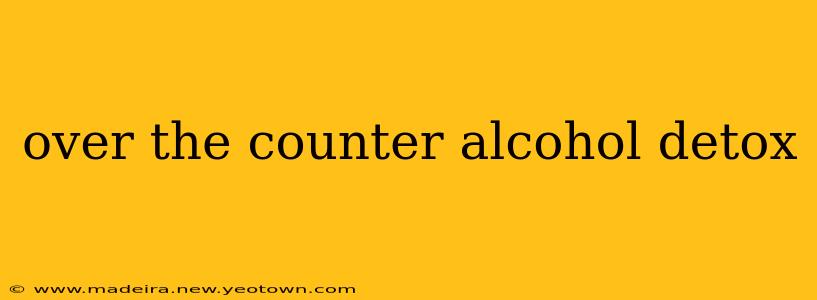The allure of a quick fix is strong, especially when grappling with the effects of alcohol consumption. The internet is flooded with promises of rapid alcohol detox using over-the-counter remedies. But is this a safe and effective approach? The short answer is a resounding no. While some OTC products might alleviate certain withdrawal symptoms, they cannot replace professional medical detox. Let's delve into the realities of over-the-counter alcohol detox and explore safer alternatives.
What are the Common Over-the-Counter Products Advertised for Alcohol Detox?
Many products marketed for "alcohol cleansing" or "detox" often contain ingredients like milk thistle, activated charcoal, or various vitamins and minerals. These are sometimes touted as capable of flushing toxins from the body and alleviating withdrawal symptoms. However, it's crucial to understand that these products lack rigorous scientific backing for their efficacy in alcohol detoxification. They may address some minor symptoms, such as headaches or fatigue, but they won't address the serious, potentially life-threatening consequences of alcohol withdrawal.
Can Over-the-Counter Products Safely Detoxify Your Body from Alcohol?
No. This is the most important point to understand. Alcohol withdrawal can be incredibly dangerous, even life-threatening. Symptoms can range from mild (headaches, nausea, anxiety) to severe (seizures, hallucinations, delirium tremens). Over-the-counter products simply aren't equipped to manage these potentially fatal complications. Attempting to detox from alcohol at home without medical supervision is extremely risky and should never be undertaken.
What are the Risks of Using Over-the-Counter Products for Alcohol Detox?
The risks associated with attempting a DIY alcohol detox using OTC products are substantial. You could experience:
- Uncontrolled withdrawal symptoms: These can lead to serious medical complications, including seizures, heart problems, and death.
- Delayed or ineffective treatment: Self-treating can delay necessary professional medical intervention, worsening the situation.
- Interaction with other medications: OTC products can interact negatively with other medications you may be taking.
- Misinformation and false hope: The misleading marketing of these products can create a false sense of security and prevent individuals from seeking proper medical care.
What are the Symptoms of Alcohol Withdrawal?
Recognizing the signs of alcohol withdrawal is crucial for seeking timely medical help. These symptoms can vary in severity depending on factors like the amount and duration of alcohol consumption:
- Mild symptoms: Headache, nausea, vomiting, sweating, anxiety, tremors, insomnia
- Severe symptoms: Seizures, hallucinations, delirium tremens (DTs) – a severe form of alcohol withdrawal characterized by confusion, agitation, and hallucinations.
What is the Best Way to Detox from Alcohol?
The safest and most effective way to detox from alcohol is under the supervision of medical professionals in a medically monitored detox facility. These facilities provide:
- Medical monitoring: Continuous monitoring of vital signs and symptom management.
- Medication management: Prescription medications to help manage withdrawal symptoms and prevent complications.
- Supportive care: A safe and supportive environment with medical professionals available around the clock.
- Individualized treatment plans: Tailored approach based on individual needs and medical history.
Where Can I Find Help for Alcohol Addiction?
If you're struggling with alcohol addiction, know that you're not alone and help is available. Reach out to:
- Your primary care physician: They can provide guidance and referrals to appropriate treatment resources.
- Substance abuse treatment centers: These centers offer comprehensive detox and rehabilitation programs.
- Alcoholics Anonymous (AA): A peer support group offering mutual support and guidance.
- SAMHSA National Helpline: A confidential, free, 24-hour-a-day, 365-day-a-year, information service, in English and Spanish, for individuals and family members facing mental and/or substance use disorders.
Alcohol detox is not a process to be taken lightly. Prioritizing your safety and seeking professional medical help is paramount. Don't gamble with your health; reach out for help today. Remember, recovery is possible.

